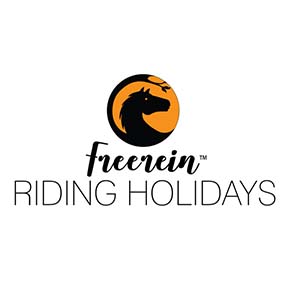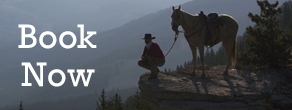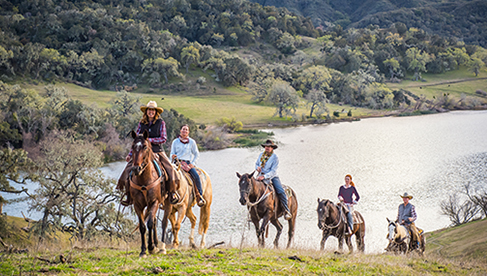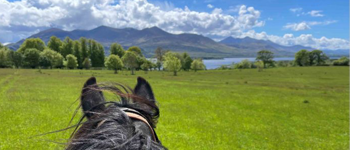Ride Green: Eco-friendly Trail Riding

by Darley Newman. Originally published in True West magazine.
Don’t consider yourself an environmentalist? If you’re a trail rider, you’re more eco-friendly than you realize.
Horseback riding is an environmentally friendly way to discover a destination. Horses may make noise as their hooves crunch over leaves that have blown onto the trail, but that’s nothing compared to the sound of an ATV. Yet just because you’re taking one eco-friendly step by exploring on horseback, doesn’t mean that your work is complete. Here are some tips to make sure your trail ride is an eco-friendly adventure.
Respect Your Natural Surroundings
On a recent ride in Alaska, I quietly observed two eagles as they kept watch over the newborn babies in their nest. The key word here is quietly. Had I yelled to the person behind me to check out the birds, these majestic eagles would likely have moved on. Being quiet as I rode by or watched was for my benefit and the animals. They were perched there to protect their young, and if scared away, who knows what predator could have taken advantage of the opening? If you’re viewing wildlife on the ground, remember to keep your distance and don’t feed them.
It’s also important to respect any historical structures you encounter on the trail. We want them to stick around for future generations, which means exploring them as the rules dictate.
Keep It Clean and Light
Pack lightly and remember to take out whatever you brought in with you. This includes that plastic wrapper from the granola bar that served as your snack on the trail. Bringing a reusable drink bottle saves money and cuts down on waste.
When camping and cooking, bring reusable utensils and cookware, and wash them and yourself with environmentally friendly soaps. This helps to ensure that the pristine stream you discover on the trail stays that way.
Leave No Trace
A big part of “leaving no trace” of yourself is staying on the trail. In Haleakala National Park on Maui, stepping off the trail on horseback would have meant that my horse’s hoof print would have stayed imprinted in the ash of this volcanic crater for a long time. Plus, this ashy terrain is home to endangered species, many of which are not visible from horseback. Now, this was an extreme place to ride, but in sensitive natural areas, the trails are there for a reason and stepping off of them can cause erosion and destroy vegetation. It can also cause others to follow your lead, making a trail where there is not supposed to be one.
Follow the Rules
Make sure to research area guidelines before you hit the trails.
Some parks and backcountry areas require that you feed your horse certified weed-free hay. If so, this is a diet to start at least several days before your trip, for the benefit of the land and your horse. Many types of hay contain the seeds of invasive species, which, once released in a new environment, could rapidly consume the natural vegetation.
Be careful about where you tie up or graze your horses. Tying to trees or other vegetation can damage them. Look into hobbling, highlines, picketing or other techniques to secure horses in a low impact way, and help keep lakes, rivers or other bodies of water clean by grazing your horses away from them.
Pay the Fees
Make sure to pay the trail fees. Our parks and open spaces need money to keep the trails in good condition. Your small payment or donation helps. I circumvent the challenge of finding a gift for someone by making a donation in the recipient’s name to an organization that supports the environment. It’s a great feel-good gift for you that can be very meaningful to the receiver.
Support the Locals
If you’re trail riding on vacation, pick a local outfitter who is a good steward of the environment. You can pat yourself on the back for giving business to someone who practices sustainable tourism. You’ll also reap the benefits of learning about the area from a local’s perspective.
Spread the Word
Traveling on horseback is a rewarding, eco-friendly way to discover the world around you. Remember to tell your friends and family, as your stories could help encourage environmental awareness and inspire them to ride.
Darley Newman is the host of the Emmy Award-winning Public Television series Equitrekking®, which takes viewers on horseback riding vacations around the world. Equitrekking is broadcast on PBS stations, Create TV and on international networks in over 65 countries.
Learn about equestrian vacations and book a trip at EquitrekkingTravel.com and the Equitrekking.com Vacation Guide.




